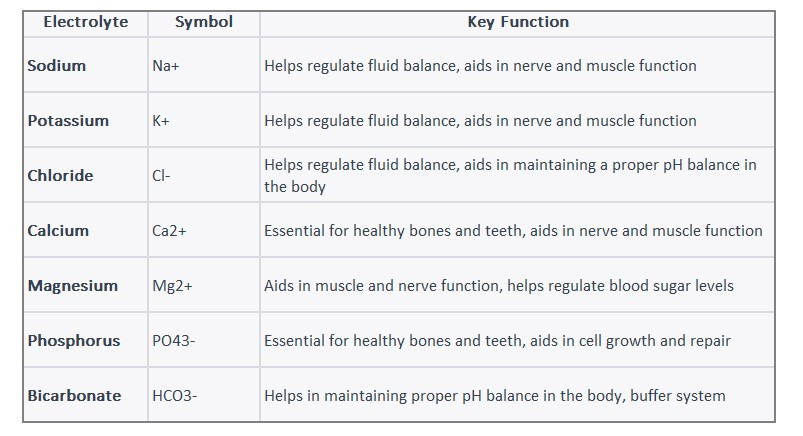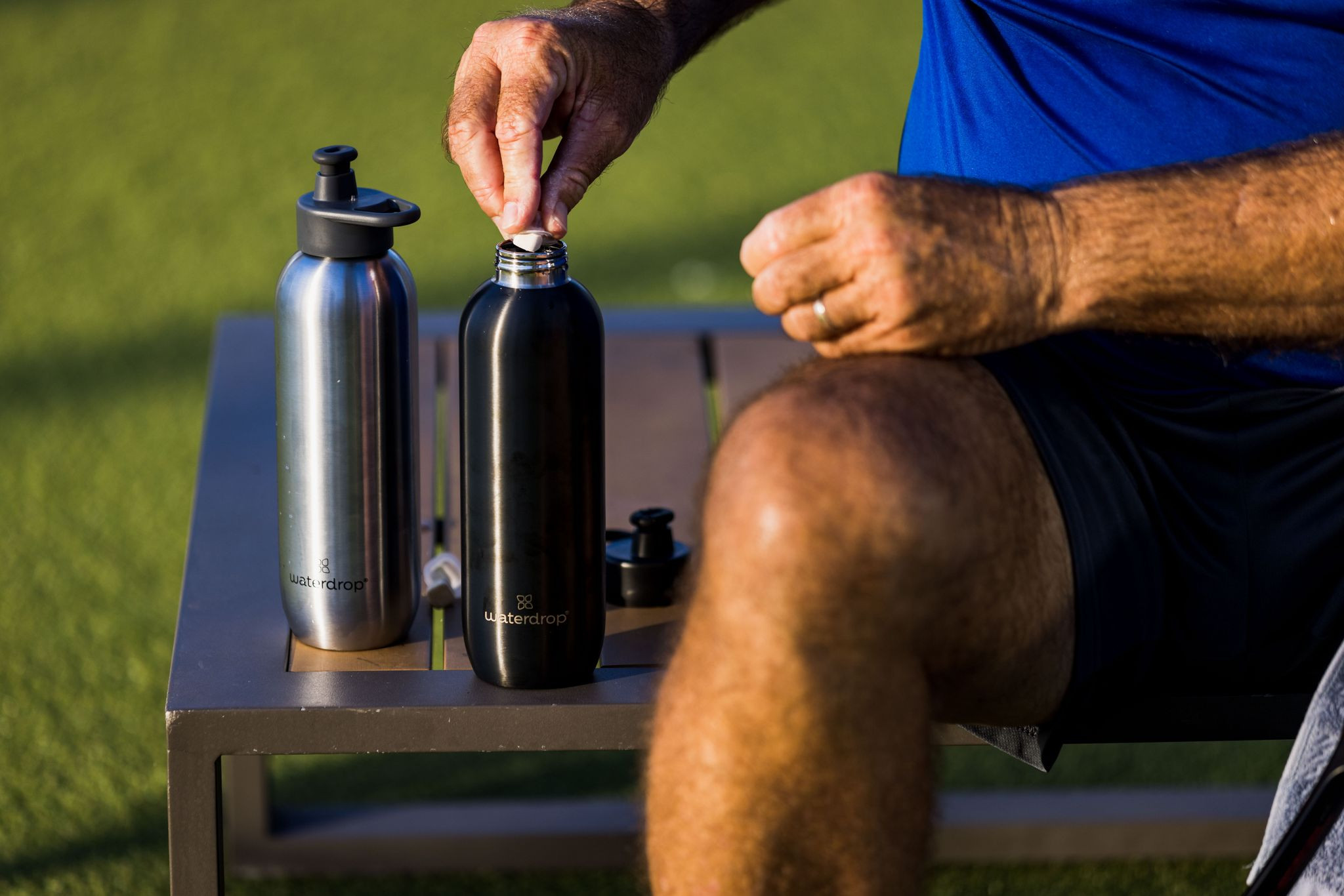Tennis
Welcome and thanks for visiting...

Electrolytes Explained: The Key to Staying Hydrated and Enhancing Athletic Performance

You've probably heard the term 'electrolytes' thrown around quite a bit in discussions about health and fitness. But do you know what electrolytes are and why they are so important to our bodies? Electrolytes are minerals that carry a charge and play a crucial role in many bodily functions, including regulating fluid balance, nerve and muscle function, and maintaining a proper pH balance. In this blog post, we'll dive deeper into the world of electrolytes and explore the different types, their key functions, and how to ensure that you have the right balance of electrolytes in your body."
Importance of Electrolytes
Electrolytes are substances that conduct electricity when dissolved in water. They are essential for maintaining the balance of fluids in the body and for the proper functioning of muscles and nerves. The major electrolytes in the body are sodium, potassium, chloride, and bicarbonate.
In addition to these major electrolytes, there are other electrolytes in the body, such as calcium, magnesium, and phosphorus, which play an important role in various functions of our body, like muscle function, nerve function, blood clotting, and maintaining healthy bones and teeth.

Sodium
Sodium is an electrolyte that helps regulate the amount of water in and around cells. It also helps maintain proper blood volume and is necessary for the proper functioning of muscles and nerves. Excess sodium can lead to high blood pressure and increase the risk of cardiovascular disease.
Potassium
Potassium helps regulate the balance of fluids in and around cells and helps maintain proper nerve and muscle function. Potassium deficiencies can result in fatigue, muscle weakness, muscle cramps, and irregular heartbeats.
Chloride
Chloride is an electrolyte that helps maintain the balance of fluids in and around cells and helps maintain proper blood volume. It also works together with other electrolytes to maintain proper nerve and muscle function.
Bicarbonate
Bicarbonate is an electrolyte that helps regulate pH levels in the body. It helps neutralize the body's acid and is important for maintaining proper digestive function and the proper functioning of muscles and nerves.
Sodium, potassium, and chloride are the main electrolytes lost through sweat, and these electrolytes play a major role in maintaining proper hydration, muscle and nerve function, and blood pressure. When the body loses too much of these electrolytes through sweat, it can lead to dehydration and electrolyte imbalances.
Consuming electrolyte-rich foods or taking electrolyte supplements can help replace the electrolytes lost through sweat and help maintain proper hydration and electrolyte balance.
Electrolyte supplements
Electrolyte supplements are a convenient and effective way to replenish the electrolytes lost through sweat and maintain proper hydration and electrolyte balance, especially for athletes and people who participate in regular physical activity. Liquid I.V. is a great option for an electrolyte supplement because of its sugar-free formula and unique cube form. The cube can be easily put into any water bottle without spilling powder everywhere, making it a convenient way to replenish electrolytes on the go.
The powder contains a balanced formula of electrolytes such as sodium, potassium, and magnesium that help to support hydration, muscle function, and overall health. Additionally, the formula is formulated to be easy on the stomach, making it a great option for those who may experience stomach upset with other electrolyte supplements. It’s easy to use and has a pleasant taste. It's important to remember that electrolyte supplements should not be used as a replacement for a balanced diet and proper hydration but as a supplement when needed.
It's important to note it's worth consulting a doctor or dietitian to ensure you are taking the right ones that fit your needs and also to ensure that you are not taking too much of any one electrolyte. For example, taking too much sodium can lead to hypertension, and taking too much potassium can cause heart problems.
Electrolyte balance
Maintaining electrolyte balance is essential for proper hydration, muscle and nerve function, and overall health. To maintain electrolyte balance, consuming a diet rich in electrolytes, such as fruits, vegetables, and dairy products, is important. Staying hydrated by drinking plenty of water is also important, especially during physical activity when electrolytes are lost through sweat. Consuming electrolyte-rich foods or taking electrolyte supplements can also help to replace electrolytes lost through sweat and maintain proper electrolyte balance. It's worth consulting a doctor or dietitian to ensure your electrolyte intake matches your needs and activities. Athletes and people who participate in regular physical activity must pay more attention to their electrolyte intake than sedentary individuals. Additionally, it's important to be mindful of your sodium intake as excessive sodium intake can lead to high blood pressure.
Dehydration symptoms
Dehydration occurs when the body doesn't have enough fluids to function properly. Symptoms of dehydration can vary depending on the severity of the dehydration, but common signs include thirst, dry mouth and throat, dark yellow urine, dry skin, fatigue, headache, and dizziness. As dehydration becomes more severe, symptoms can include confusion, dry eyes, sunken eyes, and, in extreme cases, fainting or unconsciousness. It's important to note that not all dehydration symptoms are visible, and some people may not feel thirsty even when they are dehydrated. Therefore, it's crucial to pay attention to the color of urine. If the urine is dark yellow or amber-colored, it's a sign of dehydration. Consuming water and electrolyte-rich fluids and foods can help to rehydrate the body and prevent dehydration. If you experience severe dehydration or any of the symptoms mentioned above, it's important to seek medical attention immediately.

Electrolyte Imbalance
Electrolyte imbalances occur when the levels of electrolytes in the body are too high or too low. This can happen due to a variety of factors, such as dehydration, kidney disease, diabetes, eating disorders, excessive sweating, high or low blood pressure, and overuse of diuretics.
Symptoms of electrolyte imbalances vary depending on the specific electrolyte that is affected. For example, a low level of sodium can cause muscle cramps, weakness, and fatigue, while a high level of potassium can lead to heart problems. Similarly, low levels of calcium can lead to muscle cramps and spasms, while high levels can cause confusion and disorientation. An imbalance in the level of magnesium can cause symptoms such as muscle spasms and cramps, fatigue, and irritability.
If left untreated, electrolyte imbalances can lead to serious health problems, including heart attacks, seizures, and even death. Therefore, it is important to consult a healthcare professional if you suspect you have an electrolyte imbalance. They can perform a physical examination, take a medical history, and order laboratory tests to check the levels of electrolytes in your blood.
It's important to note that electrolyte imbalances may not always have symptoms but can be determined by blood tests, and therefore, it is always better to be vigilant and regularly get yourself checked, especially if you are on medication or if you are experiencing any symptoms of imbalance.
Electrolyte replacement
Electrolyte replacement is the process of replenishing lost electrolytes in the body. Electrolytes can be lost through sweating, urination, and diarrhea; replacing them is essential to maintaining proper bodily function.
Electrolyte replacement can be done in several ways. The most common is oral replacement, which can be achieved by consuming electrolyte-rich foods or drinks. Common examples include sports drinks such as Liquid I.V., and coconut water, and foods high in potassium, such as bananas, potatoes, and sweet potatoes.
When replacing electrolytes, it is important to do so in a balanced way, as taking too much of one electrolyte can cause an imbalance in the others. It is always recommended to consult a healthcare professional for proper diagnosis and treatment before starting any replacement regimen, as electrolyte replacement requirements may vary from person to person depending on various factors like health conditions, diet, and the level of imbalance.
In conclusion, electrolytes are vital in maintaining proper hydration and aiding muscle function. By understanding the importance of electrolytes, athletes and fitness enthusiasts can ensure they are properly replenishing their bodies and unlocking their full potential. We hope this information was useful and you can now make informed decisions about your electrolyte intake. Remember to stay hydrated and keep electrolytes in mind during your athletic pursuits, and you'll be able to enjoy better performance.









